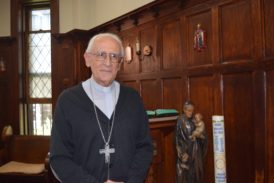
Bishop Alfonso Cabezas, C.M., has worked as missionary most of his life, first in his native Colombia, then in Africa and New York.
He has seen firsthand the devastating effects of narco-traffic, guerrilla warfare, genocide and greed. He has seen some of his brothers in Christ fall in the work they have labored in together, including Bishop Jesus Emilio Jaramillo Monsalve, whom Pope Francis will beatify on his upcoming trip to Colombia.
Through it all, Bishop Cabezas has been able to rely on a source of inexhaustible strength and peace: the Holy Spirit. He said that no matter what he may have had to deal with, he always comes back to his room and abandons all his troubles and the troubles of the world. He entrusts all them into the capable hands of the Creator, knowing his own place in the work of God.
“I am just an instrument in His hands,” he said in an exclusive interview with The Tablet.
Bishop Cabezas, now retired and living in Our Lady of Good Counsel rectory, Bedford-Stuyvesant, says that it is with profound trust that he has been awaiting Pope Francis’ visit to his homeland, including the Diocese of Villavicencio which he led from 1994 to 2001.
Pope Francis is scheduled to visit Villavicencio, where he planned to celebrate Mass and lead a prayer meeting for national reconciliation. It’s part of an ambitious visit to the South American country, Sept. 6-11. He does so just as a new peace accord has been signed between the Colombian government and FARC, a guerilla rebel militia. The accord is to end more than a 50-year conflict that many, including Bishop Cabezas, have called full out war.
The Villavicencio Diocese is larger in area than the entire country of Costa Rica, and so encompasses many different people. The city of Villavicencio, where Pope Francis will visit, borders the Andes Mountains on one side and the plains of Los Llanos on the other side. As such, it serves as a refuge to many of those displaced by the violence in the mountains.
Bishop Cabezas said that the Church in Villavicencio works to help integrate the people forced out of their homes with the city community. It has been difficult for some of the population to welcome their new neighbors. The Church reaches out to the community to show that these are just people who have been forced out of their home and need help.
Bishop Cabezas has also worked in the mountains, both as bishop and priest. He ministered to the native population and to those living alongside them. He has witnessed children being pulled into the conflict and the devastation that wreaks havoc on families.
As a representative of the Church, he tried to minister to the people’s spiritual needs. For temporal matters, he said the Church works closely with government agencies, including in the process of reintegrating FARC members. This collaboration is important because it is not the Church’s job to evaluate people on their psychological needs and social adaptations.
It is also not the Church’s job to write policy, the bishop said. Instead it is the Church’s mission to inspire policy makers and those whom the policies will affect.
Although he knows that the wounds run deep, and the tendencies toward revenge and anger may be understandable, the Church encourages peace, love and reconciliation.
He sees the pope’s visit to Colombia as an acknowledgement of the work toward peace and to give people hope. It is not an endorsement of any law or policy, but a reinforcement of a willingness to work towards peace. It is for this reason the pope will meet with people from all sides of the conflict.
Bishop Cabezas also said the pope’s visit is important to spread peace in people’s hearts. The Colombian people, a largely Catholic population, are very enthusiastic to greet him and are open to his message.
Bishop Cabezas hopes that this message of faith, hope and peace will resonate and flourish in people, so that this delicate time in Colombia will pass peacefully. He hopes the visit will inspire people to put aside their tendencies toward violence and anger forgoing on revenge on FARC now that the group has given up its weapons.
The people of Colombia yearn for peace, Bishop Cabeza said. The pope’s visit will serve as a stamp of approval on their efforts toward peace. It is up to the Holy Spirit to soften people’s hearts.
